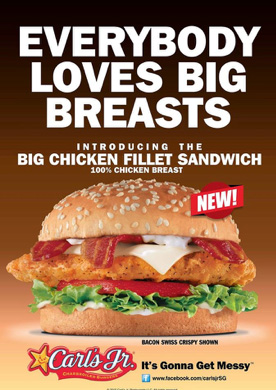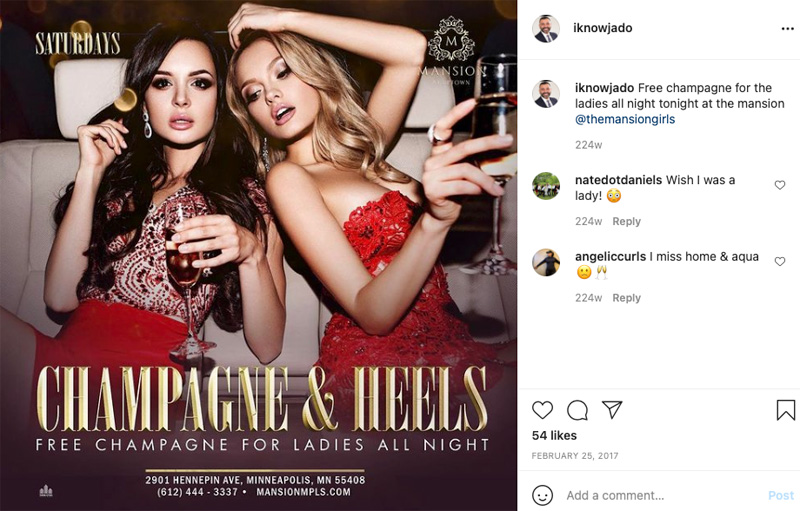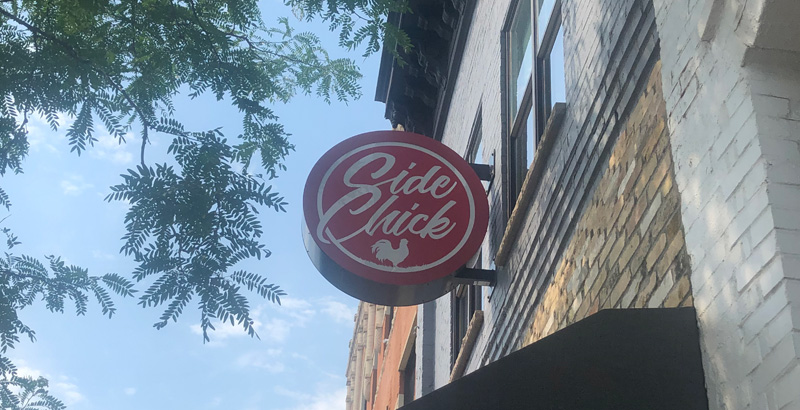A lot has happened in the discourse surrounding the name and branding of the newly opened Lyn-Lake Justin Sutherland-fronted restaurant Side Chick over the past week. One on side: critics, mainly women (many of whom have worked or are working in the hospitality industry) attacking the concept (which includes menu items such as “Nashville Hottie” and “Legs for Days”) as out of place for an industry facing a reckoning for misogyny.
On the other hand, Side Chick and Stephanie March framing the branding as edgy good fun while the restaurant deletes critical comments and blocks critics from Side Chick’s Instagram feed.
If you’ve read this far and are now asking “who cares?” or “why does this matter?”, that’s understandable. A fight about branding can seem abstract. But language connects to real life in crucial ways, says Professor Melody Hoffmann of Anoka-Ramsey Community College, whose studies have focused on the representation of marginalized groups in the media.
Side Chick’s marketing, says Hoffmann, connects to a long tradition of equating women to animals in order to sell food. “I was looking through old advertisements, and there was one for Carl’s Jr. and it said something like: ‘Everybody loves big breasts,’ referring to chicken breast sandwiches,” says Hoffmann. “There are these assumptions that men are the audience.”

“It reaffirms that women can be marketed as pieces of meat and as objects, and not as whole human beings,” says Hoffmann. “And the likelihood of women being disrespected or harassed on the street continues, right? It’s very belittling to be street harassed – we don’t feel good about that, we don’t feel good being told we have legs for days [in this context].”
A BLAST FROM THE PAST
Context and a clash of cultures seems to be at the heart of the whole Side Chick conflict. Side Chick’s overall theme has a nightclub-like quality to it, where women looking their best to attract the (often sexualized) approval of men is positive, entertaining, and a pretty big part of the point. But in a modern hospitality industry setting, revolving a theme around the physical attributes of women feels to many as hostile and dated.
Exceedingly dated, argues Hoffmann, who says the Side Chick branding concept would have been disliked by many in the 1970s, and is downright baffling in a modern context. “When you ask people who have experienced harm and harassment because of their gender, and they say: ‘This term makes me feel bad about myself,’ then I think that’s a sign not to use those terms anymore, and we take them out of our vocabulary,” says Hoffmann.
A public letter to Justin Sutherland and Side Chick from Kirstin Westby and other women in the local hospitality industry amplified this message. Westby, the wholesale director at Milk & Honey Ciders, minced no words in the letter, noting: “We’re sure you’re aware of the current reckoning in our industry for folks that identify as women, and your restaurant is sending an incredibly concerning message that’s counterproductive to this movement.
I sat down with Westby in person yesterday to get her perspective in more detail.
“When I looked into [the branding], my jaw hit the floor,” says Westby. “The timing couldn’t be more horrible, in terms of the objectification of women.” Westby pointed to the recent eruption of anecdotes of harassment and abuse in the craft beverages industry kicked off by an Instagram post by Brienne Allan as a positive sign of accountability.
“It felt like for once there was a glimmer of our voices being heard and here’s an opportunity for some institutional change,” says Westby. “And then it’s like, BAM. Side Chick restaurant. Legs for days. Caught up with your side chick. Is this a joke? Is it real? So, we said: ‘let’s make some noise.’ And that noise keeps on being shut down and ignored, and there’s barely any media and it’s just baffling and frustrating, and it feels like a slap in the face.”
The implications of sexist branding, says Westby, are more serious than they might initially seem. “If we’re OK with sexist jokes, and objectifying women, you can sit at a bar and tell those jokes and no one will say anything,” she says. “It just keeps building. It normalizes those actions, and that’s how it translates to your place of work.”
CLUB CULTURE OUT TO LUNCH
Untold in the story thus far: the distinct possibility that Sutherland owns no stake or is the minority stakeholder in the business (Lyndale Ave. Hospitality Inc.) controlling Side Chick and not the final decisionmaker on the branding. The company’s initial paperwork was filed by Jado Hark, a Coon Rapids-based realtor with a business background in nightclubs. A May 10 Facebook post by Mr. Hark looking to hire bartenders and servers suggests that he’s more than a casual participant in the venture:

And the club-focused tone of Hark’s Instagram presence suggests that he is a willing participant in the branding if not its originator.
 Heavy Table has reached out to Side Chick multiple times for comment, and emailed Hark directly, and received no reply.
Heavy Table has reached out to Side Chick multiple times for comment, and emailed Hark directly, and received no reply.
Editor’s Note, June 30, 2021: The spelling of Dr. Melody Hoffmann’s last name has been corrected. The Heavy Table regrets the error.

